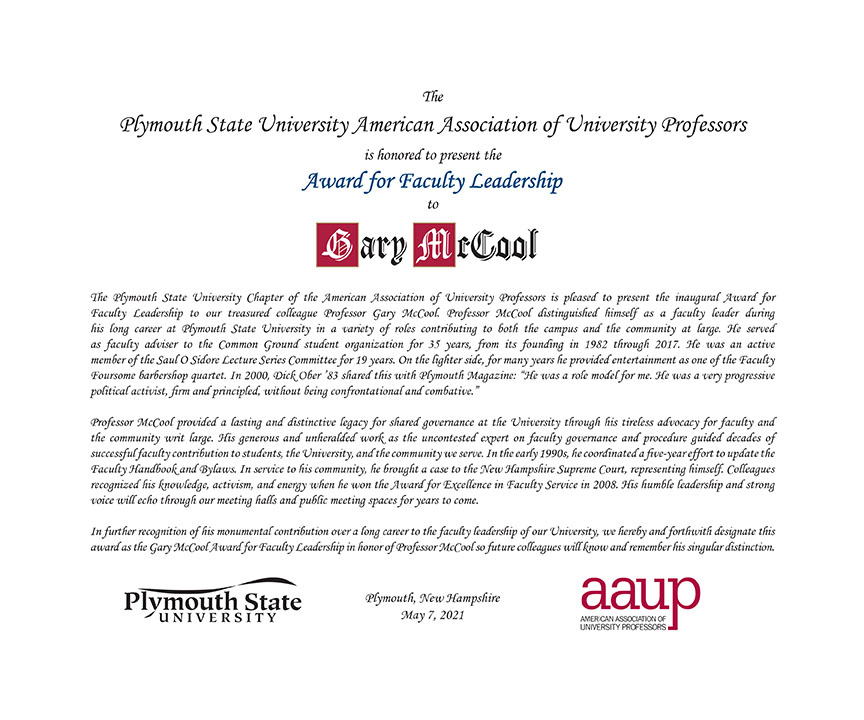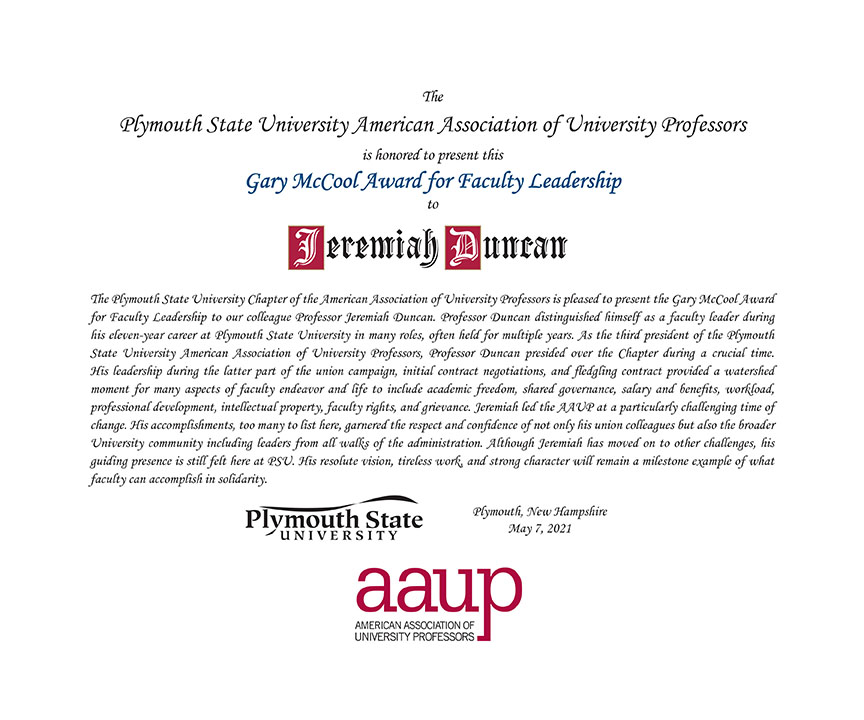The Gary McCool Award for Faculty Leadership
The Gary McCool Award is presented to PSU-AAUP members who have demonstrated leadership in a variety of faculty endeavors. These outstanding members have made concrete contributions to important aspects of faculty work such as academic freedom, shared governance, faculty welfare, organizing, membership, and/or community service. Their leadership may come in a wide variety of forms, but their commitment demonstrates sustained contributions over the length of a career at PSU.
The McCool Award is named for its inaugural recipient, Professor Gary McCool, whose extraordinary contributions to Plymouth State University over a long career serve as an inspiration and a beacon to us all.
PSU-AAUP members may nominate any member who has been in good standing for at least 3 years. Nominations may be made to any member of the Executive Committee. Awardees are determined by a vote of the Executive Committee. This award is given as deemed appropriated by the Executive Committee and is not required to be annual.

The Plymouth State University Chapter of the American Association of University Professors is pleased to present the inaugural Award for Faculty Leadership to our treasured colleague Professor Gary McCool. Professor McCool distinguished himself as a faculty leader during his long career at Plymouth State University in a variety of roles contributing to both the campus and the community at large. He served as faculty adviser to the Common Ground student organization for 35 years, from its founding in 1982 through 2017. He was an active member of the Saul O Sidore Lecture Series Committee for 19 years. On the lighter side, for many years he provided entertainment as one of the Faculty Foursome barbershop quartet. In 2000, Dick Ober ’83 shared this with Plymouth Magazine: “He was a role model for me. He was a very progressive political activist, firm and principled, without being confrontational and combative.”
Professor McCool provided a lasting and distinctive legacy for shared governance at the University through his tireless advocacy for faculty and the community writ large. His generous and unheralded work as the uncontested expert on faculty governance and procedure guided decades of successful faculty contribution to students, the University, and the community we serve. In the early 1990s, he coordinated a five-year effort to update the Faculty Handbook and Bylaws. In service to his community, he brought a case to the New Hampshire Supreme Court, representing himself. Colleagues recognized his knowledge, activism, and energy when he won the Award for Excellence in Faculty Service in 2008. His humble leadership and strong voice will echo through our meeting halls and public meeting spaces for years to come.
In further recognition of his monumental contribution over a long career to the faculty leadership of our University, we hereby and forthwith designate this award as the Gary McCool Award for Faculty Leadership in honor of Professor McCool so future colleagues will know and remember his singular distinction.

The Plymouth State University Chapter of the American Association of University Professors is pleased to present the Gary McCool Award for Faculty Leadership to our colleague Professor Jeremiah Duncan. Professor Duncan distinguished himself as a faculty leader during his eleven-year career at Plymouth State University in many roles, often held for multiple years. As the third president of the Plymouth State University American Association of University Professors, Professor Duncan presided over the Chapter during a crucial time. His leadership during the latter part of the union campaign, initial contract negotiations, and fledgling contract provided a watershed moment for many aspects of faculty endeavor and life to include academic freedom, shared governance, salary and benefits, workload, professional development, intellectual property, faculty rights, and grievance. Jeremiah led the AAUP at a particularly challenging time of change. His accomplishments, too many to list here, garnered the respect and confidence of not only his union colleagues but also the broader University community, including leaders from all walks of the administration. Although Jeremiah has moved on to other challenges, his guiding presence is still felt here at PSU. His resolute vision, tireless work, and strong character will remain a milestone example of what faculty can accomplish in solidarity.